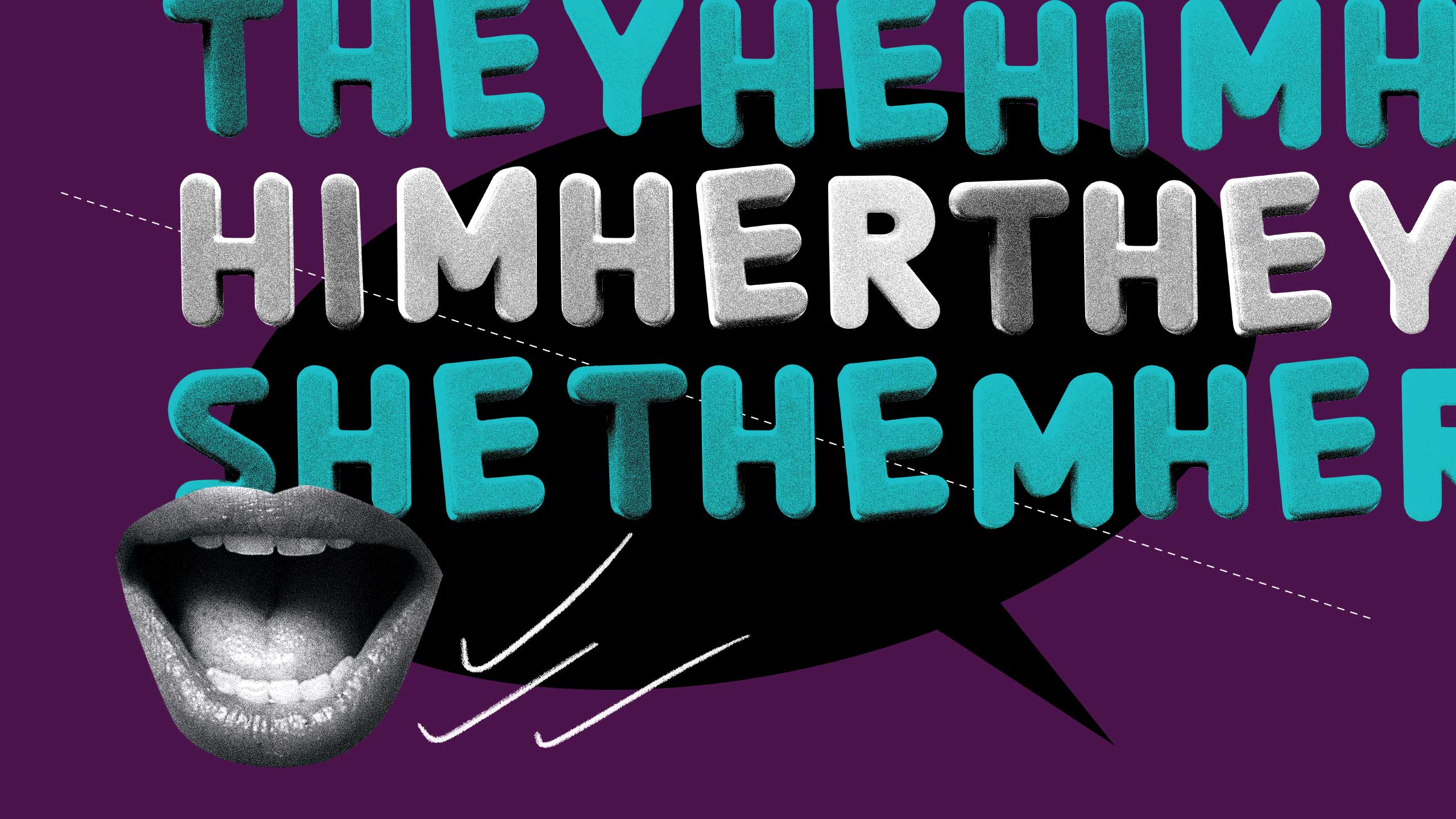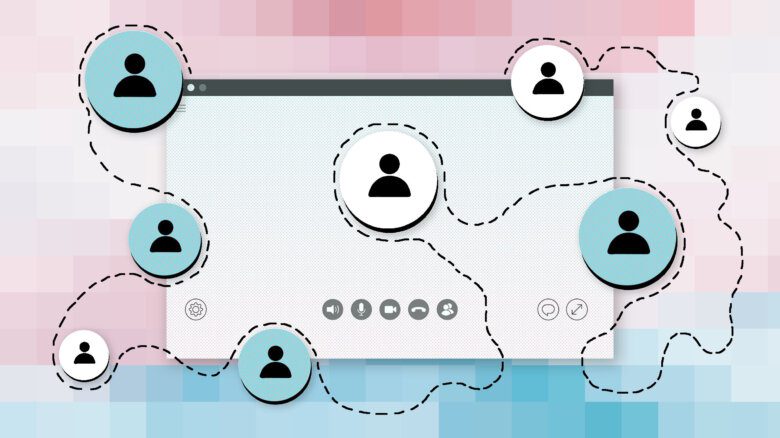Pronouns. Pretty much everyone’s got ’em.
Whether you’re a they or a he or a she or a ze, something else or some combination of them all, almost everyone has pronouns they use in some way or another. We use pronouns every single day. But as more high-profile people come out as queer and trans, the expansiveness and possibility of pronouns—and how people can get them wrong—is being talked about more and more.
Last week, the singer Lizzo made headlines for correcting a paparazzo using the wrong pronouns to describe recently-out non-binary pop star Demi Lovato. It was a nice moment, albeit soured by media coverage that subsequently got it wrong in the headlines of the story.
Truly, give me an oral history of how Entertainment Weekly published they/them in the subheading and still used “she” in the headline and throughout the article THAT WAS LITERALLY ABOUT MISGENDERING LOVATO.
The incident has once again sparked important conversations about how to ask for and correct peoples’ use of someone’s pronouns. What Lizzo did is a great example of allyship: she didn’t put Demi in a compromising position, and everyone won.
But sometimes you can be too nosy about it. A few weeks ago, I went to a store to return an online order of some jeans that didn’t fit. Partway through the transaction, which literally just involved taking back a pair of jeans and refunding me, the clerk looked my queer-ass self over and paused.
“What pronouns do you use?” she asked.
I was caught by surprise, told her and immediately felt weird about it. Are my pronouns necessary to return a pair of jeans? Was she out here asking every single cis, straight-passing man for their pronouns? I doubt it. Nowhere in our two-minute transaction did she actively need to use them, and it felt almost symbolic rather than, you know, useful.
Normalizing and talking about pronouns and being gender-inclusive is great, but it’s important to know that not every situation requires a loud response. Sometimes being well-intentioned about these things can lead to overstepping. Sometimes people aren’t out yet, or have only recently changed their pronouns; often an increased focus on pronouns means a disproportionate spotlight on visibly queer people who are just trying to lead out lives.
But using proper pronouns is still an important and easy way to support everyone around you.
It’s complicated. But thankfully, I’m here to help you wade through all of the complications. May I present to you Xtra’s very important guide for being normal and chill about pronouns for people who want to be better about asking for and correcting them.
What are pronouns?
Grammatically speaking, they are words used in the place of nouns, often to shorten them. In English, we have two major “gendered” pronouns: he/him and she/her. But they/them is equally valid, as are zi/zir, xe/xem and a host of other neopronouns (a category of “new” pronouns).
Here are some pronouns in a sentence!
Lizzo is an ally, she corrected a photographer when he misgendered Demi Lovato, who uses they/them pronouns.
Your pronouns are whatever you want them to be. The best pronouns to use for someone are the ones they ask you to use for them.
But if you don’t know someone’s pronouns, it’s widely accepted to default to the so-called “gender-neutral” they/them. For example:
That person over there seems really cool, I wonder if they will be my friend.
Some people are comfortable using multiple pronouns to identify themselves. For example, if someone has she/they in their social media bio, that probably means you can use either to refer to them. The choice to put one in front of the other can indicate a preference within that comfort with both—if someone changes their pronouns from she/they to they/she, that may mean they prefer using “they” rather than “she,” but are okay with people using either.
There are some people comfortable with using a bunch of pronouns, like basketball player Layshia Clarendon, who uses they, she and he. And you might see them all in a sentence like this:
Layshia Calrendon can shoot a basketball, they dribble well, she is appreciated by teammates and he is a proud advocate for the trans community.
How do I ask for someone’s pronouns?
Politely, simply and without making a big deal of it—basically like asking someone their name. Even better, offer up yours too!
“Hi, I’m ____ and my pronouns are ___ and ____. What pronouns can I use for you?”
“I’m ____. I use __ and __ pronouns. If it’s all right to ask, what should I use for you?”
And depending on the situation, it’s also okay to ask someone about another person’s pronouns. Maybe a friend has a new partner in their life—it’s totally fine for you to ask your friend what pronouns to use for their partner.
“Damn, that person you’re dating is smokin’. What pronouns should I use when fawning over them?”
“I think your new partner is great. Could you remind me which pronouns they use?”
When should I ask for someone’s pronouns?
When you’re meeting someone new and you’re probably going to talk to or about them again.
When they ask for your pronouns.
When you need to refer to that person in a public way, like in an interview or TV appearance (journalists, here’s lookin’ at you—ask all of your sources for their pronouns, whether they look queer or not!!).
When you’ll be working directly with someone and referring to them in the third person.
When you have one of the above reasons and they aren’t easily accessible in a public forum. For example, if I interview Demi Lovato, I don’t need to make a big show of asking their pronouns, because there’s a lot of public information out there about how they use they/them. Or, if I meet a new friend who is wearing a cool they/them button on their jacket, I don’t really need to ask the obvious. (Though I could use complimenting their button as a way to introduce my pronouns!)
When should I not ask for someone’s pronouns?
When you think they look “queer” so you want to be sure.
When you think they look “trans.”
When you’re singling them out and not asking everyone in a situation.
When they might not be in a safe space to disclose.
Okay, I need an example. I think my landscaper might be queer, should I stop them to ask for their pronouns?
Unless there’s a situation where you’re going to use them, you probably don’t need to!
I think my bus driver might be queer, should I stop them to ask their pronouns?
You probably don’t need to!
I think my neighbour might be queer, should I stop them to ask their pronouns?
You probably don’t need to!
I think my mailm—
I THINK YOU GET THE POINT HERE.
Okay, so I know when to ask and when not to ask. If someone tells me their pronouns, I can go forth and use them everywhere, right?
Not necessarily! Especially if someone isn’t publicly out yet—they may be comfortable using their pronouns only with you, so it can be a good idea to clarify where and when they’re comfortable using their pronouns and where they may still be closeted.
Again, this may not be a conversation to have with your barber. But if a close family member or friend comes out to you using different pronouns than they previously did, it can be a good idea to clarify if they’d be okay with you using them everywhere. Maybe they aren’t out to their mom yet, and would prefer you publicly use their previous pronouns. Maybe they’re comfortable using them with close family, but not publicly online. These things are nuanced.
Oh my god, I messed up someone’s pronouns! Am I a horrible person? How should I apologize?
So you’ve asked for your friend, family member or acquaintance’s pronouns and you have your answer. That’s great! But then you slip up and use a pronoun or name they formerly used. Should you be banished to the pits of hell, forever branded as a terrible ally? Should you apologize profusely and make a big deal about it? Should you find the tallest mountain, climb to the top and proclaim to all the land that the person’s pronouns are actually something else and that you are an awful person for getting them wrong?
No! Just apologize and get it right next time. It can be embarrassing or uncomfortable for someone if you make a bigger deal than necessary out of your mistake. If you make a mistake, apologize, correct yourself and move on. Your guilt is rarely productive.
The most important part is that you internally pledge to get it right from now on.
My friend doesn’t have pronouns in their social media bio. Does that mean they hate trans people?
No! Some folks may not have pronouns in their social media bios because they’re figuring things out, or may not be publicly out to everyone. If their pronouns aren’t public and there’s a good reason for you to know (see above), just ask politely!
And if the friend is cis and doesn’t have a reason to be private about their pronouns, encourage them to put their pronouns in their bio as a way to normalize talking about them!
My friend/family member just used the wrong pronouns for someone. How can I fix it?
So you’re at a family barbecue this summer and your well-meaning dad starts going on about how Demi Lovato is “such a nice girl” and “she needs to release some new music to keep up with the other pop stars.” What do you do?
Much like in a personal setting, you don’t have to make this a cataclysmic event. Just correct the situation and offer up some further reading.
“Hey dad, not sure if you saw the news, but Demi is non-binary and uses they/them pronouns now! Just like my friend [insert name of one of the many cool non-binary friends I assume you have] I told you about, isn’t that cool?”
If a friend or family member uses the wrong pronouns for someone you personally know when they should know better—for example, your sibling has been out as using they/them for a while now—you can correct the person who used the wrong pronouns. But remember not to make it about you and to keep the involved person’s comfort level in mind.
Let’s go back to the dad at the barbecue. If he casually uses the wrong pronoun for your sibling, it may be as simple as pulling him aside and reminding him about your sibling’s pronouns. Making a big declarative statement shaming your dad in front of the whole family may not be what your sibling wants.
“Hey dad, remember that ___ uses they/them now. I know mistakes happen, but I think it would mean a lot to them if you try to get it right.”
How can I be an ally to queer, trans and non-binary people when it comes to pronouns?
Well, first of all, you could send all of us $500. My electronic money transfer address is…
Oh, you mean in terms of pronouns? Talk to the trans and non-binary people in your life, but also talk to the cis people in your life. Normalize things like pronouns in social media bios and email signatures, so you don’t even have to have the face-to-face conversations discussed above.
Especially if you’re cisgender, offer up your pronouns and work to create a space where everyone is comfortable talking about their pronouns, no matter their gender.


 Why you can trust Xtra
Why you can trust Xtra


